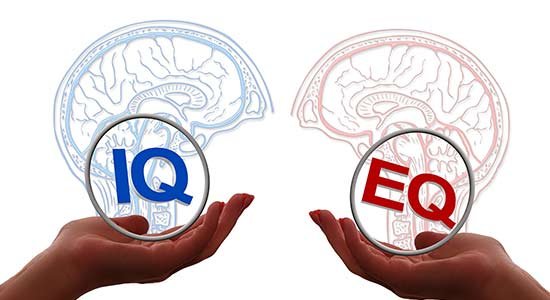Many individuals often concentrate on developing their mental abilities, like intelligence, and their physical skills, such as strength, but frequently overlook the importance of emotional intelligence. This emotional aspect plays a crucial role in achieving personal and professional success.
Some individuals appear to manage their emotions more effectively than others, while some people struggle to understand emotional intelligence or harness their feelings in a positive way.
Emotional intelligence is an important skill to learn. The world is full of people who do not understand their emotions or those of others.

They are the ones who feel bad for no reason, who get angry at the wrong time, who can’t control their feelings, and who don’t know how to deal with other people’s emotions. And they often suffer because of it.
To achieve a happy life and lasting success, it’s essential to develop strong emotional management skills, both for yourself and in your interactions with others. Learning how to manage emotions effectively can lead to greater happiness, improved relationships, and overall personal success.
What is Emotional Intelligence?
Emotional intelligence is the ability to recognize your own and others’ emotions, identify and label them, and understand their effects on your own and others’ behavior. You can learn to manage your feelings in different situations. For example, you can learn how to stay calm when you are upset or smile when you feel sad.
Emotional intelligence can help you deal with others’ emotions. For example, if someone is angry at you, you can understand why and deal with the situation accordingly. You can also use your emotional intelligence to deal with your own emotions. For example, if you are angry, you can think about how you feel and what you are going through. This helps you understand your emotions better and allows you to deal with them.
You can develop your emotional intelligence by learning new ways to recognize, identify, and label emotions. Also, you can learn to understand the effects of your own and others’ emotions on their behavior.
How Do You Measure Emotional Intelligence?
There are several ways to measure emotional intelligence, but each method comes with its own limitations. For instance, some individuals struggle to express their emotions either verbally or in writing, making accurate emotional intelligence assessment challenging. Additionally, it’s important to note that recognizing emotions is different from effectively managing or regulating them.

Some emotional intelligence tests measure your ability to understand emotions in yourself and others better than others. Others test the way you react to different situations emotionally, such as how well you can handle criticism or anger from other people.
The two most common ways to measure emotional intelligence are self-report and performance-based.
Self-report measures involve filling out questionnaires that ask you to rate your own emotions and abilities in various areas.
Performance-based tests measure how well you can identify and label emotions in other people.
Self-report measures are more reliable and are usually used to measure emotional intelligence in children.
Why Is Emotional Intelligence So Important?
Emotions affect every aspect of daily life—they affect how we think, behave, feel, and relate to others. People who have a high level of emotional intelligence know when to use certain behaviors to deal with their feelings and those of other people. They understand that it is crucial to be flexible in dealing with any situation because almost everything in life has an emotional aspect that needs to be considered.
People who do not understand their own or other people’s emotions often make the wrong decisions that lead to negative consequences in life. For example, they can become angry at someone for no reason and ruin a relationship; they can act insensitively toward others’ feelings and push them away; they can feel bad about themselves for no reason and make unhealthy choices.
What Does Emotional Intelligence Look Like?
The most obvious sign of emotional intelligence is controlling your behavior when you are upset or stressed out.
Even if you are feeling very angry with someone, it is vital to deal with your emotions constructively so that nothing gets worse than it already is. People with high emotional intelligence know when they should calm down to deal with a situation constructively.

People with strong emotional intelligence are usually very aware of their emotions and can control them easily, even when they are upset.
They know what makes them feel good about themselves and can show empathy toward other people’s feelings.
Even if they are suffering, these people can still be sensitive toward other people’s suffering because they understand that everyone goes through hard times in life.
What Are the Characteristics of People Who Have Emotional Intelligence?
People with high emotional intelligence tend to have specific characteristics:
They don’t just listen—they also empathize.
When someone is talking to them, they do not just wait for their turn to speak or think about what they will say next. Instead, they are focused on that person and understand the emotions behind their words.
They are not afraid of emotions, unlike people who have low emotional intelligence.
For example, if someone is angry, these people do not deny it or avoid the person because they know that everyone has emotions sometimes.
They try to understand how others feel even before others can clearly explain themselves.
When something happens to other people, they immediately think about what the other person might be feeling too—they try to see things from another point of view. This helps them win respect and appreciation from other people regardless of whether they agree with them or not.
People who have high emotional intelligence are usually confident.
Even if they are afraid or uncertain about something happening, they can still keep their emotions under control.
They know that expressing negative emotions is not always helpful.
They try to understand the situation before taking any action, especially if it involves others.
They do not get embarrassed easily or act awkward when they talk to people because they understand what others are feeling.
For example, these people can even diffuse an argument between two friends by letting each person express their side without judging them harshly. People who have high emotional intelligence also know how to prevent conflicts from happening in the first place by being aware of other people’s feelings and needs.
Emotional Intelligence and IQ.
Emotional intelligence depends on the ability to understand and express emotions, so it is different from IQ.
People with high IQs can solve problems well. In contrast, people with low emotional intelligence may respond appropriately in social situations but sometimes act insensitively toward other people’s feelings or needs.

IQ is easy to understand, but emotional intelligence can be hard to grasp.
Emotional intelligence is the ability to recognize and understand emotions in yourself and others and your ability to use this awareness for decision-making or problem-solving.
People with high emotional intelligence are usually adept at communication; they are aware of body language and social cues and are involved in various aspects of their community.
They tend not only to be good at identifying what others feel but also explain why they feel that way.
People with high IQ can recognize emotions, but they might not know how to respond appropriately.
High emotional intelligence usually comes with a high IQ, yet it is possible to have one without the other.
IQ refers to objective intelligence measured by IQ tests, while Emotional intelligence refers to subjective intelligence measured through different means, including assessment tools.
Emotional Intelligence and IQ are two concepts that are often confused because of their similar terminology; however, they are distinct from each other in terms of traits, skills, and abilities.
Therefore, both can be further understood using the following points:
- EI cannot be measured through a simple test or exam; instead, it can be best understood by reviewing different biographical accounts of notable people who have demonstrated high EQ throughout their lives. On the other hand, IQ can be objectively measured since it is a comparative measure between others of the same age group.
- Nature: The second difference between EQ and IQ is that EQ comes more naturally to some people than others based on one’s personality type/traits. At the same time, IQ is an absolute measure not dependent on an individual’s personality.
- Emotional competencies: Another difference between Emotional Intelligence (EQ) and IQ is that emotional intelligence focuses on the abilities of others while IQ is directed toward problem-solving within oneself.
- Representative Activities: High IQ tests require advanced skills in abstract reasoning, comprehension, quantification, and knowledge of formal operations, whereas high EI involves an understanding of emotions, moods, feelings, body language, facial expressions, etc.
- People with high IQ are often academically successful, while people who have a high EQ tend to be better-liked by their peers.
- IQ might remain unchanged throughout one’s life, while emotional intelligence can improve based on various factors, including lifestyle choices, environmental factors, and personal interactions with others. IQ tends to increase slowly from age 7 to 14 as children gradually develop cognitive abilities such as abstract thinking and problem-solving skills. In contrast, emotional intelligence tends to increase from age 18 onward since it requires an individual’s conscious effort to continue developing these abilities rather than just gaining them naturally.
Using Your Emotions To Make Better Decisions.
People often talk about making decisions ‘with your heart and not your brain.’
But is this helpful? Does using emotions lead to better decision-making than using pure rational thought?
Research suggests that the answer is yes. Using emotions to make decisions can lead to better outcomes than just using rationality alone. This is because emotions do more than just color our thinking – they also give information about the world.

So, instead of ignoring your emotions or suppressing them, it is better to let them inform you and make a decision that is a balance between both thinking with your head and feeling with your heart.
Here’s how:
You can enhance the benefits of using emotions by taking control of your emotional state before making decisions, as each emotion has different effects on how we process information. For example, if you’re angry, you will be less likely to analyze all the information available and more likely to focus on one particular piece of information, e.g., an irrelevant detail such as an unimportant word in a contract or unhelpful action from someone else.
If you are making a decision when in an enthusiastic state, however, you will be more likely to take on board lots of different pieces of information that are not relevant to the decision. This can lead to lots of extra work even if your choice is ultimately the same as it would have been in a different emotional state.
How can you make sure that you are in the right frame of mind for making decisions?
The first step is to make sure that you are in a good state emotionally. This means being relaxed and calm. You can do this by using relaxation strategies or taking a short break from your decision-making until you feel more comfortable.
Then think about the situation. Ask yourself what emotion it calls for. Do you need to be enthusiastic? Or calm? Then visualize the outcome of deciding with that particular emotion present, e.g., making an important business deal while feeling confident instead of anxious.
This will allow you to decide whether there is enough evidence for an enthusiastic approach or not enough evidence for a calm one – and help guide your decision-making process through visualization.
As emotions play such an essential role in making decisions, it is important to think about what emotions will improve your decision-making.
What emotions can help you make the best choices?
Two basic emotions will help your decision-making:
- Calm – when you need to be objective and ensure that you don’t let one aspect of the situation cloud your judgment. This means making a balanced, logical decision based on all the available information. For example, if you need to decide which car insurance policy is best, try not to focus on how much you like or dislike any particular company but think about what it provides as objectively as possible.
- Enthusiastic – when there is not enough evidence for an enthusiastic approach. Sometimes we don’t have enough information about something, e.g., whether someone is trustworthy or whether a product works, before making a final decision, so we need to gather more evidence first. When that is the case, you can use an enthusiastic state of mind to motivate yourself and encourage yourself to be creative and proactive in your search for information.
For example, if you’re trying to decide whether or not to buy a new house but aren’t sure what kind of neighborhood it’s located in, take some time out from your decision-making until you feel enthusiastic. Then, try to think outside the box – such as go talk to people around the neighborhood (if possible) instead of just looking at online listings – until you have enough information to make a balanced decision.
You will probably find that this process feels much more natural than just sitting down and thinking about things logically by yourself because it allows you to be more creative and find the most helpful information quickly.
This approach can also be applied when we create a vision for ourselves.
You imagine what you want your future to look like in as much detail as possible. Inevitably, this will involve some emotional content because our brains are wired to think logically and emotionally, e.g., how excited or happy something makes us feel about the future, etc., so it’s important to make sure that your vision includes positive emotions rather than negative ones.
For example, if you’re trying to set a goal of being healthier and fitter next year, try visualizing yourself going on a run at the beach while feeling energized and keeping up with your new exercise schedule as opposed to visualizing yourself struggling on the treadmill and not having time for your daily workout.
Feeling confident.
While it’s important to visualize success, e.g., feeling confident about buying a new car, it’s equally – if not more – important that we envision our failures too. This is because we need to prepare ourselves for obstacles that we may face along the way by anticipating what might happen. Also, using visualization techniques to see around those corners and stay motivated and optimistic even when things get tough, e.g., preparing yourself mentally for the possibility of rejection or failure before attending a job interview or asking someone out on a date.
To make the most of this approach, try imagining real situations from your past (or future) where you could use this approach successfully to see how it made a positive impact.
For example, if you’re preparing for a job interview and want to be more confident about everything that could go wrong, try visualizing yourself going on a job interview recently where you felt nervous. Then use visualization techniques to imagine being calmer and successfully making a good impression.
Visualizing success.

Then think of as many new situations as possible where this approach will help you feel optimistic before the event itself. Come up with different questions which might come up during the interview, or plan what you’ll say if your interviewer asks why they should hire someone like you instead of choosing from an average applicant pool.
Visualize success first on its own, then with obstacles put in place to make sure that our brain can get used to the idea of both possibilities before we get there so that it doesn’t automatically get locked into a negative thought pattern.
With all this, don’t forget to take periodic breaks from thinking about whatever you’re trying to visualize because otherwise, your brain will get stuck in thought loops and won’t easily be able to pick up new information along the way. You can also try different visualization techniques until you find one that works especially well for you and effectively triggers emotions.
5 Steps for Understanding Your Emotions.
1: Identify your emotions.
By understanding your emotions, you can connect with what you feel instead of simply reacting to them. This allows you to make more informed decisions and understand what drives those choices.
We usually identify our emotions as positive or negative even though many of our spectrums exist, such as feeling content but also a little dissatisfied at the same time. This could be understood as a blend of both – just somewhere in between – instead of purely one or the other.
Color-coding scales are a simple way for kids and adults to visualize their feelings on different topics and help them understand and listen more realistically and effectively.
When it comes to identifying our emotions, we all have different experiences, so there’s no right or wrong way to go about it. It’s a good idea to try out as many techniques as possible until you find something that works well for you.
Knowing whether someone else is also feeling the same way can help us understand our feelings better. For example, chances are one person feeling anxious about meeting someone from their friend group for dinner isn’t that different from other people’s experiences with anxiety because we all want to make a good impression and be around friends who understand us.
2: Determine whether this feeling is temporary or long-term.
Sometimes we might feel a certain way because of circumstances that may pass, e.g., being stressed at work because of a deadline. Still, other emotions are often linked with the people and parts of our lives that stay around longer, e.g., anxiety about not getting enough sleep if we’re usually tired when we wake up in the morning and need to start another day full of responsibilities soon afterward.
3: Identify the triggers behind your emotions.
We need to understand why we’re feeling certain ways because our feelings are usually based on something that has happened or that is about to happen (such as expecting rejection) and what is going on in our lives at the time.
For example, being lied to usually causes feelings of betrayal and anger because it comes from a place of broken trust, which might have been there all along or existed after a particular incident that shattered our worldview. If lying people constantly surround us, this could lead to feeling repeatedly betrayed without realizing why – until we finally work out where these emotions are coming from.
Sometimes even thinking about an upcoming event like an interview where you might start to worry and get nervous is enough to trigger certain emotions if we don’t know why it makes it harder to manage these feelings and understand them.
4: Understand how emotions affect other people around you.
Our emotions significantly impact other people and ourselves, so being aware of this can help us keep our feelings in check and consider the other people involved.
Sometimes we might try to change someone else’s behavior by making them angry or happy. Still, those emotional changes don’t always happen immediately unless there is a sudden positive or negative trigger that only lasts for a short time before things go back to normal.
In some cases, people will continue acting as they usually would do even if they’re feeling differently inside because that’s just who they are – i.e., their character – and it takes a bit more to change that. Even then, there is no guarantee that they might not revert to their usual self, so we must be patient and understanding.
5: Label how you’re currently feeling.
This part of the process is about becoming familiar with different words to describe how we feel. Over time we can gradually build up a greater and greater vocabulary that allows us to communicate complex emotions with others – and even just between ourselves – and understand why we feel the way we do.
We might already know some words like happy, sad, anxious, or angry. Still, hundreds of other emotional words all describe differently nuanced feelings to help us become more in tune with ourselves.
Why not try taking a look at this Feeling Wheel of emotional words to get started?

6: Recognize how you react to certain feelings.
We might not always react to a particular emotion in the same way because different people respond differently. For example, one person often gets angry when they feel threatened while someone else feels sad instead – which is still a valid response even if it seems less “visible.”
However, sometimes we might feel the emotion and not know how to react to it healthily. Suppose we don’t understand what’s happening. In that case, our reactions might not be logical or constructive, and they can even end up hurting other people. If we’re jealous of someone else but don’t know how to deal with that, we might lash out aggressively instead because we can’t control ourselves.
7: Seek support when you need it.
There are times when managing our emotions is difficult, even for the most emotionally intelligent people, so there’s nothing wrong with asking for help. One example of this would be someone who has a panic attack but doesn’t want others to realize what they feel because they don’t want to show their vulnerabilities. In that case, it would be better if they could talk to somebody privately about their anxieties.
Even something like seeing a therapist might not seem like an obvious solution, but sometimes it’s the best one depending on your situation. A therapist could provide all sorts of tools and techniques to help you cope with your emotions in a healthier way that might otherwise take years of trying on your own without success.
8: Find solutions for managing specific feelings.
Many of our feelings are valid, so understanding where they come from can help us deal with them rather than bottle them up inside until they start spilling out at weird moments. For example, if we get angry because someone makes us feel humiliated, then taking responsibility for our feelings and standing up to the person is one way of dealing with it (taking an assertiveness class might help).
However, suppose our anger is related to depression. In that case, we might feel like there’s no point in standing up to people, so perhaps it would be better to talk to someone about that, e.g., a counselor or therapist who could help us draw strength from within ourselves while still maintaining healthy relationships with others.
9: Realize emotions are constantly changing.
Emotions don’t necessarily last forever; even if they’re complicated feelings like anger or guilt, then eventually, they will fade away without our having to do anything more than just wait patiently for them to pass on their own. We don’t need to worry too much or try forcing things because that can often worsen, especially if the issue has become psychological instead of merely situational.
10: Learn from your emotions.
Our emotions can often be difficult to manage at the moment, but there’s almost always something we can learn from them. If we don’t like how we feel when we get jealous, for example, then perhaps we can figure out why that is and prevent it on future occasions (e.g., by not letting our fears take control of us).
11: Learn to cope with difficult emotions.
Even if some people mistake certain feelings as bad or wrong, that doesn’t mean they’re inherently harmful. Guilt, for example, might be uncomfortable, but it’s still something valuable because it tells us what behaviors weren’t responsible enough, so now is a chance to make things right again.
Other examples of these reactions are sadness, depression, anger (when it’s not used in an abusive way), and anxiety. If we’re feeling these sorts of emotions, then instead of trying to get rid of them entirely, perhaps the best course of action is to learn how to cope with their powerful effects, so they don’t take over our lives completely.
The process starts with you taking action because nobody else can do that for you.
Remember, even if emotions are challenging to deal with at times, it doesn’t mean there’s something wrong with us just because they’re hard to handle – especially since some people might have more trouble coping than others, depending on their circumstances.
Effects of Emotional Intelligence.
There are many effects of emotional intelligence, from increased self-awareness to improved relationships with others.
Some effects include:
- Emotional intelligence is linked to psychological well-being. A person with high emotional intelligence has less trouble moving on from adverse life events.
- Emotional intelligence enhances communication; expressing one’s emotions results in greater social support and better romantic relationships.
- Emotional intelligence facilitates the ability to make better decisions, leading to increased life satisfaction and success.
- In organizations, emotionally intelligent individuals are more likely to be selected for promotions, resulting in higher self-esteem and job satisfaction.
- Individuals with high emotional intelligence have a greater sense of personal initiative which promotes proactive behaviors that enhance their work productivity resulting in a better performance for the organization as a whole.
- People who experience greater levels of self-awareness are more likely to take responsibility for their own lives. They tend to know what they want and go after it.
- People with higher levels of self-regulation don’t let their emotions overwhelm them; they think before they act, even when under stress or pressure.
- Emotional intelligence is associated with better physical health 1; people who score high on emotional intelligence tests lead healthier lifestyles, resulting in lower blood pressure and more robust immune systems.
- Highly emotionally intelligent people can be more open-minded, which results in greater creativity and innovative thinking. Research has shown that there is a link between emotional intelligence and recognizing patterns, which enhances one’s perception skills, allowing for heightened awareness and resulting in astute observations about other people’s behavior.
- Higher EI facilitates a higher degree of affective well-being, allowing people to understand their deeper emotions better.
There is still work to do.
It is important to note that there are still questions concerning the exact nature and consequences of emotional intelligence, given that the construct is relatively new in its current form, which means researchers will need time to sort out these issues.
In addition, research findings suggest that EI might be more beneficial in some work situations than others; for example, salespeople tend to benefit from high EI because they need strong interpersonal skills to establish rapport with clients. But workers doing independent tasks without an emphasis on teamwork do not necessarily require heightened levels of EI.
Resources.
Books:
Emotional Intelligence: Why It Can Matter More Than IQ, 2005
Permission to Feel Paperback, 2020
EQ Applied: The Real-World Guide to Emotional Intelligence, 2018
Videos:
Lisa Feldman Barrett – You aren’t at the mercy of your emotion – your brain creates them.
Daniel Goleman – Why aren’t we more compassionate?
How to master your emotions – emotional intelligence.
You can also improve your emotional well-being by doing relaxation exercises like yoga, meditation, outdoor activities like hiking or gardening, or any other activity that helps reduce stress and puts you in a better mood.
Conclusion.
We hope you’ve found the information in this blog post helpful and that it will inspire you to explore emotional intelligence more deeply. How can we help? If there is anything else you would like us to cover, please let us know!
As always, if our posts resonate with your interests or needs, please comment below and share them on social media channels for others who may find them helpful as well.
Thank you so much for reading; we look forward to hearing from you soon!

Joanna Perez is a Certified Cognitive Behavioral Therapy Practitioner, a passionate blogger, writer, traveler, wife, and mother of one boy. Joanna loves to share her thoughts on parenting, health, wellness, and lifestyle.
She is a Certified Women Empowerment Life Coach and has done courses on Life Mastery, Happiness, Health, and Success. She also has studied Neuroscience for Parents and took the Skilled Helper Training Course.
She believes in helping people become the best version of themselves and strives to provide quality informative and inspiring content. She loves animals, especially her two cats, and can often be found taking photos of them as they pose for the camera.


